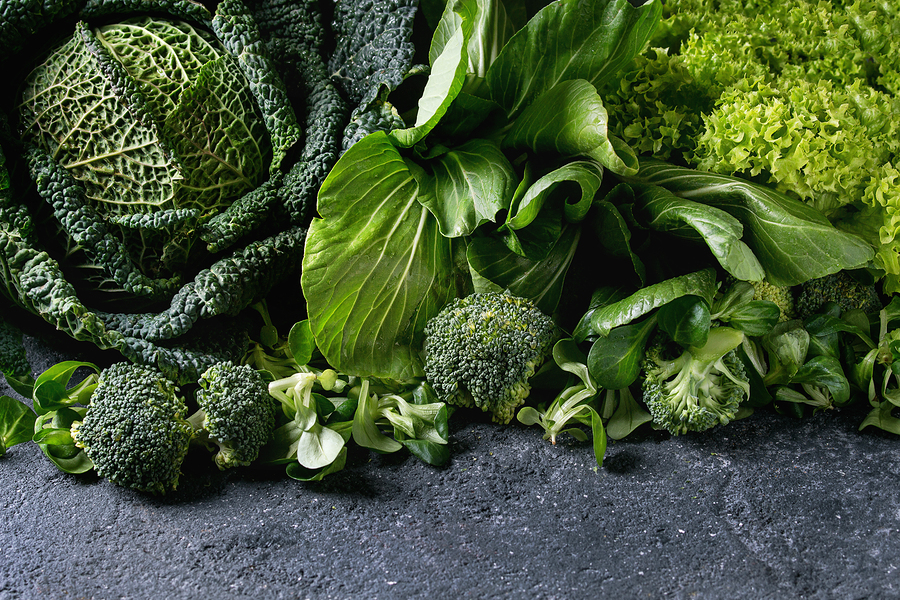How to get more lung-saving vitamin K in your diet
Vitamin K could seriously improve your lung function
Higher levels of vitamin K – which can be found in broccoli and spinach, among other foods – could lead to better lung function, a new report has revealed.
Researchers of a study published in the journal ERJ Open Research, saw a team of Danish researchers from Copenhagen University Hospital and the University of Copenhagen, examine more than 4,000 people aged 24 to 77.
The results showed that people with higher levels of vitamin K – which the body needs for blood clotting, helping wounds to heal – were less likely to have serious problems like asthma and chronic obstructive pulmonary disease (COPD).
So, where can we get more of this lung-saving vitamin K deliciously and easily?
Leafy green pesto

Homemade pesto could contain lots of leaves
Take something you love, and use vitamin K-rich leaves to make it.
“For a full-on wallop of vitamin K, make a dark leafy green pesto to accompany your favourite pasta,” says author of Do Yourself A Flavour, Fliss Freeborn.
“Strip kale from its woody stems, tear or chop the leaves roughly, pop into a bowl and pour over boiling water. Let that sit for one minute to blanch, then drain and place into a blender with plenty of cold-pressed rapeseed oil – which is also a great source of vitamin K – some cashews, a handful of basil, a good pinch of salt, and optionally, some nutritional yeast or parmesan – depending on your preference,” she explains.
“Blend until you have a smooth, dark green puree and toss this around your favourite pasta.”
Change up your oils
Maybe you use olive oil or butter for everything you cook, regardless of what it is. Well, a different oil may help.

Rapeseed oil is a great source of vitamin K
“Use more rapeseed oil for a subtle vitamin K boost. Its mild, nutty flavour lends itself surprisingly well to fruitcakes: take 120ml of rapeseed oil, and mix it with three eggs, 50ml of milk, 125g of soft dark brown sugar, and 250g of self-raising flour, along with a teaspoon of cinnamon,” Freeborn explains.
“Stir in 400g of dried mixed fruit, pour into a loaf tin and bake for 45 minutes to an hour at 170 degrees.”
Prioritise spinach

Wilted spinach can go in pretty much anything
Delicious iron-rich spinach is a great source of vitamin K and is so easy to use. Don’t be afraid to chuck it in anything.
“Wilt it into your dahls, curries, clear dashi broths, stews, soups and pasta sauces,” says Freeborn.
“And don’t be shy with the quantities either – spinach shrinks away into nothing, and a 400g bag will happily pack down into a large pan in a matter of moments, giving you a huge vitamin K boost. ”
Use the whole beetroot
Summer is a great time to get into beetroot, but many people don’t know they can use the whole plant.
The glorious colours of beetroot leaves pic.twitter.com/EU6Vk2hm8k
— Kenny Higgs (@kennyhiggs) July 10, 2022
“Don’t throw away your beetroot leaves if you’re buying fresh beetroot – they’re a great source of vitamin K. Instead, toss them into a simple salad, dressed with plenty of cold-pressed rapeseed oil and sharp apple-cider vinegar. ”
Say yes to soybeans
“Soybeans are packed full of both plant protein and vitamin K; they are readily available frozen as edamame beans from larger supermarkets.
View this post on Instagram
“Use frozen edamame as you would peas – serve them as a side with mint and butter, use them in rice bowls, or blitz them down to a chunky puree with salt, olive oil and chilli flakes, for a greener, leaner take on smashed avocado,” advises the cookery writer.
Make a meal of it
Why not incorporate vitamin K into every area of a protein-filled meal?

Add as many sources of vitamin K as you like
“Animal products such as meat, cream and cheese provide small amounts of vitamin K,” says Freeborn.
“For a fully ‘K’d-up’ meal, why not serve pan-seared chicken breasts with a nutmeg and spinach potato dauphinoise? Simply blanch the spinach in boiling water, wring it out and add between the layers of potato when making your dauphinoise, not forgetting to grate plenty of fresh nutmeg into the cream too.”
The Press Association
Latest posts by The Press Association (see all)
- 5 new books to read this week - March 26, 2025
- 6 things a physio wishes people over 60 would stop doing - March 25, 2025
- NHS reminder to 7.5m people as Covid-19 jab booking system opens - March 25, 2025
- The truth about cholesterol – what you need to know - March 25, 2025
- Prince William calls Dame Mary Berry a ‘national treasure’ in 90th birthday message - March 24, 2025




















